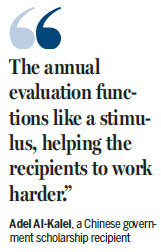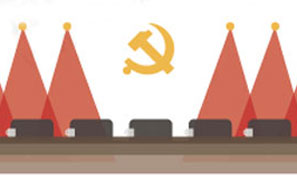1,171 foreign students lose govt scholarships
An official with China Scholarship Council said an annual evaluation system has been effective in ensuring the quality of foreign recipients of Chinese government scholarships.
The evaluation system was introduced in 2002, and 1,171 recipients of the State-level scholarship have lost the approval needed to receive scholarship money, said Cao Shihai, deputy secretary-general of the China Scholarship Council. Cao spoke on Thursday, the first day of the two-day 17th China Annual Conference for International Education, held in Beijing.
The council, which reports to the Ministry of Education, issues and administers the scholarships.
"Most of the suspensions or deprivations resulted from the students' bad attitude toward studies, or a breach of their Chinese universities' regulations and rules," he said.
The government has not released the total amount of money earmarked for the national scholarships.

But according to recent council data, the number of recipients has been increasing quickly as more students come to study in China.
In 2011, almost 26,000 students from across the world received the Chinese government scholarship. That grew to more than 40,000 students last year, accounting for 10 percent of students studying in China.
"Through measures including the evaluation system, a better management of the scholarship program and its recipients will be achieved, and the quality of the recipients will be improved," Cao said.
The annual evaluation mainly reviews the recipients' test results, class attendance and daily performance at their Chinese universities in the previous academic year. The results determine whether the students will be granted the scholarship during the next academic year.
Some universities publicly list those who fail to pass the annual evaluation.
Adel Al-Kalei, a doctoral student of general surgery at Zhejiang University, has been studying in China since he was an undergraduate in 2002.
The 34-year-old from Yemen, who has received the Chinese government scholarship for 11 years, said he thinks the annual evaluation is a must, as "otherwise, some students may think that they could still enjoy the scholarship however they behave or perform".
He said some of his peers lost their qualifications for funding during those 11 years.
"But very few," Al-Kalei said. "Mostly because they failed exams or broke laws of China.
"The annual evaluation functions like a stimulus, helping the recipients to work harder and pay more attention to their daily performance, such as attendance," he added.
- Is it a thing? 10 odd jobs where you can make good money
- Message on a bottle: Mineral water company launches drive to find missing children
- Sun Yat-sen champion of national integrity, unity: Xi
- Four killed, two injured after house collapses in C China
- Cross-Straits forum held to commemorate Sun Yat-sen





















